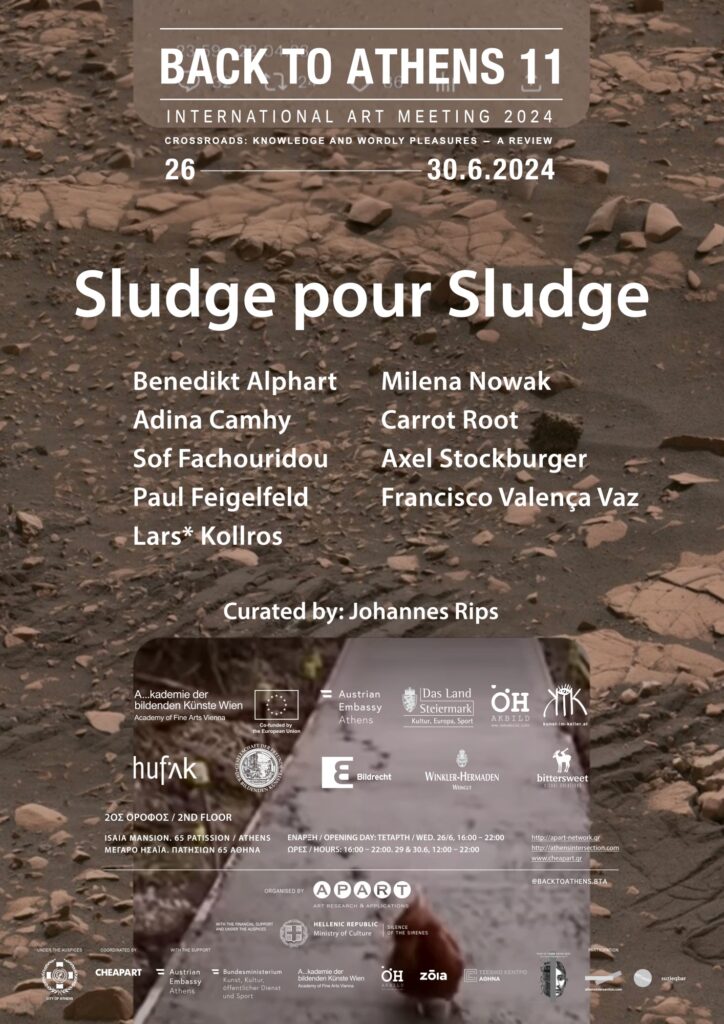
“I’ve seen things you humans would never believe!”, says Rutger Hauer to us as the doomed replicant Roy Batty, pointing out post-humanist problems and the limits of humanism for us with this statement as early as 1982.
We condense this in the contemporary media phenomenon of “sludge content” *, which serves as an argumentative, visual and theoretical starting point for this exhibition.
The phenomenon of sludge content shows very clearly how much the Internet and technology influence our lives. Computers are no longer just utilities or tools. There is an interaction between humans and machines. Specific actions are influenced by algorithms whose complex structure can often no longer be understood. Machines learn independently via deep learning, produce content autonomously and receive this again in a feedback loop as material from which they learn.
Accordingly, when machines learn from sludge content, we manage to take the principles of hermeneutics ad absurdum and demonstrate the limits of a humanistic and rationalistic understanding of culture, as well as contemporary post-human developments.
Sludge content thus becomes a confusion tactic by and for machines.
At the same time, research is continuing into an all-powerful, all-encompassing artificial intelligence that can trump us in all areas of life. The question of post-human rights and obligations to life will arise, as will the question of safety mechanisms to be able to somehow tame such a machine if necessary.
We also want to argue that we are, or at least should be, deep in a post-humanist education debate. When we talk about machine learning, we are also talking about immanent questions of education and subject theory that have their origins not least in long-standing humanistic approaches.
There is no doubt that the social transformation towards post-humanism is one of the greatest challenges of our time and is inextricably linked to the finite resources of our planet and capitalist mechanisms of exploitation.
In addition to the exhibition itself, the concept sees itself as a mediation and exchange space that provides hybrid guided keynotes, artist talks and workshops during the duration of the festival. Selected up-and-coming Austrian artists have been curated and invited to engage with current developments in post-humanist strategies and processes of subjectivation.
Curated by: Johannes Rips
Artists and Talk-Guests: Benedikt Alphart, Adina Camhy, Sof Fachouridou, Paul Feigelfeld, Lars* Kollros, Milena Nowak, Carrot Root, Axel Stockburger, Francisco Valença Vaz.
Sponsors/ supported by:
Akademie der bildenden Künste Wien, Austrian Embassy Athens, Land Steiermark, ÖH.akbild, Hufak, Gesellschaft der Freunde der bildenden Künste, Bildrecht, Bittersweet, Weingut Winkler-Hermaden
The exhibition is presented as part of Back to Athens 11 International Art Meeting | 2024: Crossroads – knowledge and worldly pleasures – a review
In Conversation
Friday 28.6
8:30 – Axel Stockburger and Paul Feigelfeld
Livestream:
https://us02web.zoom.us/j/82253755741?pwd=WarYqq6pN6YvLzHUChZb7gBCgxgo6Z.1
Saturday 29.6.
8:00 – Artist Talk with Tal Adler and Osama Zatar about the OneState Embassy
Livestream:
https://us02web.zoom.us/j/82253755741?pwd=WarYqq6pN6YvLzHUChZb7gBCgxgo6Z.1
Sunday 30.6.
6:30 Talk by Sof Fachouridou, Milena Nowak and Lars* Kollros
Livestream:
https://us02web.zoom.us/j/82253755741?pwd=WarYqq6pN6YvLzHUChZb7gBCgxgo6Z.1